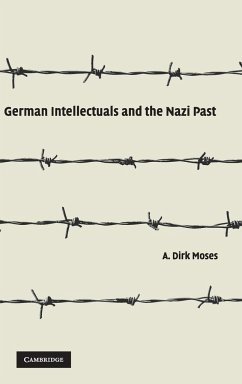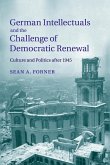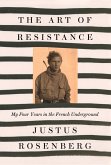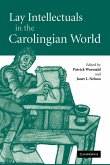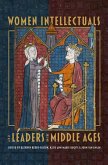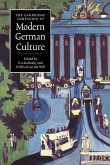A. Dirk Moses (Professor of Global and Universit Colonial History
German Intellectuals and the Nazi Past
A. Dirk Moses (Professor of Global and Universit Colonial History
German Intellectuals and the Nazi Past
- Gebundenes Buch
- Merkliste
- Auf die Merkliste
- Bewerten Bewerten
- Teilen
- Produkt teilen
- Produkterinnerung
- Produkterinnerung
This book examines the relentlessly polarized West German intellectual debates about the Nazi past.
Andere Kunden interessierten sich auch für
![German Intellectuals and the Challenge of Democratic Renewal German Intellectuals and the Challenge of Democratic Renewal]() Sean A. Forner (Michigan State University)German Intellectuals and the Challenge of Democratic Renewal40,99 €
Sean A. Forner (Michigan State University)German Intellectuals and the Challenge of Democratic Renewal40,99 €![The Art of Resistance The Art of Resistance]() Justus RosenbergThe Art of Resistance17,99 €
Justus RosenbergThe Art of Resistance17,99 €![Lay Intellectuals in the Carolingian World Lay Intellectuals in the Carolingian World]() Lay Intellectuals in the Carolingian World52,99 €
Lay Intellectuals in the Carolingian World52,99 €![The German Empire, 1871-1918 The German Empire, 1871-1918]() Roger Chickering (Washington DC Georgetown University)The German Empire, 1871-191841,99 €
Roger Chickering (Washington DC Georgetown University)The German Empire, 1871-191841,99 €![Disability, the Body, and Radical Intellectuals in the Literature of the Civil War and Reconstruction Disability, the Body, and Radical Intellectuals in the Literature of the Civil War and Reconstruction]() Sarah E. Chinn (City University of New York Hunter College)Disability, the Body, and Radical Intellectuals in the Literature of the Civil War and Reconstruction44,99 €
Sarah E. Chinn (City University of New York Hunter College)Disability, the Body, and Radical Intellectuals in the Literature of the Civil War and Reconstruction44,99 €![Women Intellectuals and Leaders in the Middle Ages Women Intellectuals and Leaders in the Middle Ages]() Women Intellectuals and Leaders in the Middle Ages55,99 €
Women Intellectuals and Leaders in the Middle Ages55,99 €![The Cambridge Companion to Modern German Culture The Cambridge Companion to Modern German Culture]() Eva Kolinsky / Wilfried van der van der Will (eds.)The Cambridge Companion to Modern German Culture42,99 €
Eva Kolinsky / Wilfried van der van der Will (eds.)The Cambridge Companion to Modern German Culture42,99 €-
-
-
This book examines the relentlessly polarized West German intellectual debates about the Nazi past.
Hinweis: Dieser Artikel kann nur an eine deutsche Lieferadresse ausgeliefert werden.
Hinweis: Dieser Artikel kann nur an eine deutsche Lieferadresse ausgeliefert werden.
Produktdetails
- Produktdetails
- Verlag: Cambridge University Press
- Seitenzahl: 304
- Erscheinungstermin: 16. Februar 2016
- Englisch
- Abmessung: 240mm x 161mm x 21mm
- Gewicht: 574g
- ISBN-13: 9780521864954
- ISBN-10: 052186495X
- Artikelnr.: 22753352
- Herstellerkennzeichnung
- Libri GmbH
- Europaallee 1
- 36244 Bad Hersfeld
- gpsr@libri.de
- Verlag: Cambridge University Press
- Seitenzahl: 304
- Erscheinungstermin: 16. Februar 2016
- Englisch
- Abmessung: 240mm x 161mm x 21mm
- Gewicht: 574g
- ISBN-13: 9780521864954
- ISBN-10: 052186495X
- Artikelnr.: 22753352
- Herstellerkennzeichnung
- Libri GmbH
- Europaallee 1
- 36244 Bad Hersfeld
- gpsr@libri.de
Dirk Moses studied history in Australia, Scotland, the United States and Germany before joining the History Department at the University of Sydney in 2000. As a research fellow at the University of Freiburg, he worked on postwar German debates about the recent past, a project which became German Intellectuals and the Nazi Past. He has edited and co-edited four anthologies on genocide, mainly on the relationship with colonialism. He has held fellowships in Austria, Germany, Israel and the USA, most recently at the Woodrow Wilson International Center for Scholars in Washington, DC. Currently, he is Professor of Global and Colonial History at the European University Institute in Florence, Italy, where he is finishing a book manuscript entitled Genocide and the Terror of History. He is also working on a project called 'The Diplomacy of Genocide', which studies international reactions to allegations of genocide in postcolonial conflicts in the 1960s and 1970s.
1. Stigma and structure in German memory
2. The languages of republicanism and West German political generations
3. The Forty-Fivers: a generation between fascism and democracy
4. The German German - the integrative republicanism of Wilhelm Hennis
5. The non-German German - the redemptive republicanism of Jurgen Habermas
6. Theory and practice: science, technology, and the republican university
7. The crisis of the republic: 1960-7
8. 1967 and its aftermath
9. The structure of discourse in the 1980s and 1990s
10. History, multiculturalism, and the non-German German
11. German Germans and the old nation
12. Political theology and the dissolution of the underlying structure.
2. The languages of republicanism and West German political generations
3. The Forty-Fivers: a generation between fascism and democracy
4. The German German - the integrative republicanism of Wilhelm Hennis
5. The non-German German - the redemptive republicanism of Jurgen Habermas
6. Theory and practice: science, technology, and the republican university
7. The crisis of the republic: 1960-7
8. 1967 and its aftermath
9. The structure of discourse in the 1980s and 1990s
10. History, multiculturalism, and the non-German German
11. German Germans and the old nation
12. Political theology and the dissolution of the underlying structure.
1. Stigma and structure in German memory
2. The languages of republicanism and West German political generations
3. The Forty-Fivers: a generation between fascism and democracy
4. The German German - the integrative republicanism of Wilhelm Hennis
5. The non-German German - the redemptive republicanism of Jurgen Habermas
6. Theory and practice: science, technology, and the republican university
7. The crisis of the republic: 1960-7
8. 1967 and its aftermath
9. The structure of discourse in the 1980s and 1990s
10. History, multiculturalism, and the non-German German
11. German Germans and the old nation
12. Political theology and the dissolution of the underlying structure.
2. The languages of republicanism and West German political generations
3. The Forty-Fivers: a generation between fascism and democracy
4. The German German - the integrative republicanism of Wilhelm Hennis
5. The non-German German - the redemptive republicanism of Jurgen Habermas
6. Theory and practice: science, technology, and the republican university
7. The crisis of the republic: 1960-7
8. 1967 and its aftermath
9. The structure of discourse in the 1980s and 1990s
10. History, multiculturalism, and the non-German German
11. German Germans and the old nation
12. Political theology and the dissolution of the underlying structure.

